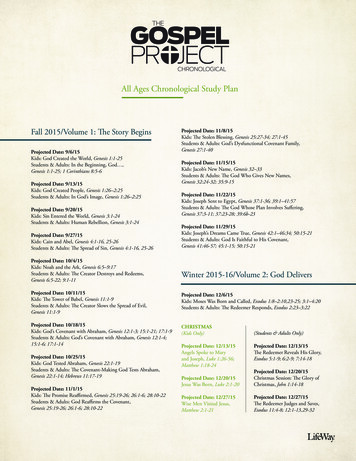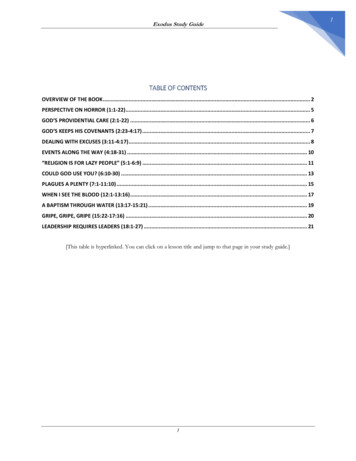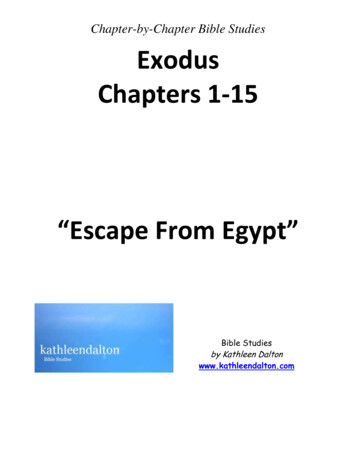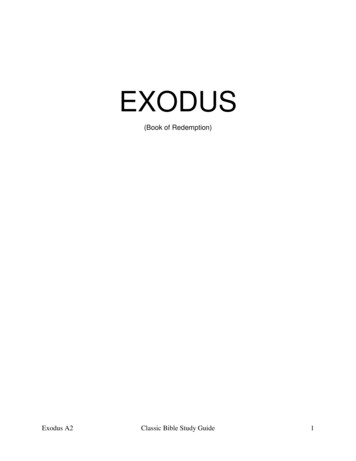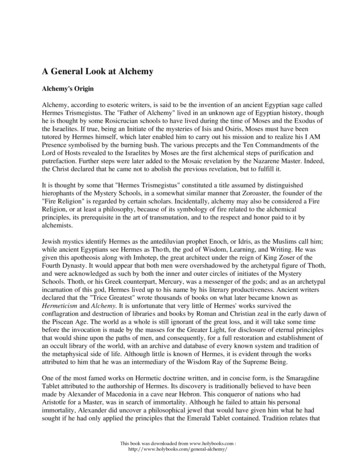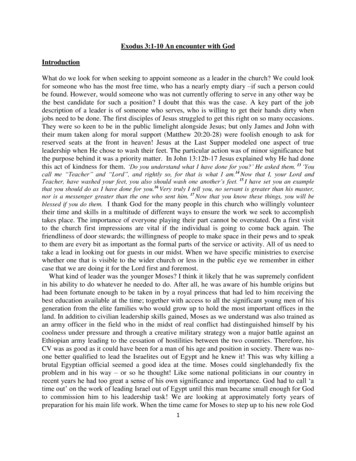
Transcription
Exodus 3:1-10 An encounter with GodIntroductionWhat do we look for when seeking to appoint someone as a leader in the church? We could lookfor someone who has the most free time, who has a nearly empty diary –if such a person couldbe found. However, would someone who was not currently offering to serve in any other way bethe best candidate for such a position? I doubt that this was the case. A key part of the jobdescription of a leader is of someone who serves, who is willing to get their hands dirty whenjobs need to be done. The first disciples of Jesus struggled to get this right on so many occasions.They were so keen to be in the public limelight alongside Jesus; but only James and John withtheir mum taken along for moral support (Matthew 20:20-28) were foolish enough to ask forreserved seats at the front in heaven! Jesus at the Last Supper modeled one aspect of trueleadership when He chose to wash their feet. The particular action was of minor significance butthe purpose behind it was a priority matter. In John 13:12b-17 Jesus explained why He had donethis act of kindness for them. ‘Do you understand what I have done for you?’ He asked them. 13 ‘Youcall me “Teacher” and “Lord”, and rightly so, for that is what I am.14 Now that I, your Lord andTeacher, have washed your feet, you also should wash one another’s feet. 15 I have set you an examplethat you should do as I have done for you.16 Very truly I tell you, no servant is greater than his master,nor is a messenger greater than the one who sent him. 17 Now that you know these things, you will beblessed if you do them. I thank God for the many people in this church who willingly volunteertheir time and skills in a multitude of different ways to ensure the work we seek to accomplishtakes place. The importance of everyone playing their part cannot be overstated. On a first visitto the church first impressions are vital if the individual is going to come back again. Thefriendliness of door stewards; the willingness of people to make space in their pews and to speakto them are every bit as important as the formal parts of the service or activity. All of us need totake a lead in looking out for guests in our midst. When we have specific ministries to exercisewhether one that is visible to the wider church or less in the public eye we remember in eithercase that we are doing it for the Lord first and foremost.What kind of leader was the younger Moses? I think it likely that he was supremely confidentin his ability to do whatever he needed to do. After all, he was aware of his humble origins buthad been fortunate enough to be taken in by a royal princess that had led to him receiving thebest education available at the time; together with access to all the significant young men of hisgeneration from the elite families who would grow up to hold the most important offices in theland. In addition to civilian leadership skills gained, Moses as we understand was also trained asan army officer in the field who in the midst of real conflict had distinguished himself by hiscoolness under pressure and through a creative military strategy won a major battle against anEthiopian army leading to the cessation of hostilities between the two countries. Therefore, hisCV was as good as it could have been for a man of his age and position in society. There was noone better qualified to lead the Israelites out of Egypt and he knew it! This was why killing abrutal Egyptian official seemed a good idea at the time. Moses could singlehandedly fix theproblem and in his way – or so he thought! Like some national politicians in our country inrecent years he had too great a sense of his own significance and importance. God had to call ‘atime out’ on the work of leading Israel out of Egypt until this man became small enough for Godto commission him to his leadership task! We are looking at approximately forty years ofpreparation for his main life work. When the time came for Moses to step up to his new role God1
gave him the blessing of the support of his older brother. Exodus 7:6-7 states: Moses and Aarondid just as the Lord commanded them.7 Moses was eighty years old and Aaron eighty-three when theyspoke to Pharaoh. There is no greater confirmation of Isaiah 55:8-9 than in this story here. ‘ForMy thoughts are not your thoughts, neither are your ways My ways, declares the Lord. 9 ‘As the heavensare higher than the earth, so are My ways higher than your ways and My thoughts than your thoughts.What we need to focus on are the next two verses Isaiah 55:10-11: As the rain and the snowcome down from heaven, and do not return to it without watering the earth and making it bud andflourish, so that it yields seed for the sower and bread for the eater, 11 so is My word that goes out fromMy mouth: it will not return to Me empty, but will accomplish what I desire and achieve the purpose forwhich I sent it. We have to remember that though God promises to hear and answer our prayers.The answers that come may be very different to what we were expecting to receive. This is ofvital importance to note because unless we grasp this we may be looking for an answer to comesometimes that God has already provided, in response to our petitions to Him.1.It was unexpected (Exodus 3:1-3)(a)The setting (Exodus 3:1a) Now Moses was tending the flock of Jethro his father-in-law, the priest ofMidian Moses was at work engaged in the familiar routine that he had been faithfullycommitted to for approximately four decades. From daily encounters with royalty and serving inprominent public positions in Egypt Moses now has spent the majority of his adult life as ashepherd looking after a flock of sheep in the desert. We need to remember, as Joseph remindedhis brothers prior to their move to Egypt that this was the lowest form of employment in the eyesof an Egyptian. (Genesis 46:31-34: 31 Then Joseph said to his brothers and to his father’s household, ‘Iwill go up and speak to Pharaoh and will say to him, “My brothers and my father’s household, who wereliving in the land of Canaan, have come to me. 32 The men are shepherds; they tend livestock, and theyhave brought along their flocks and herds and everything they own.”33 When Pharaoh calls you in andasks, “What is your occupation?” 34 you should answer, “Your servants have tended livestock from ourboyhood on, just as our fathers did.” Then you will be allowed to settle in the region of Goshen, for allshepherds are detestable to the Egyptians.’) God allowed His chosen servant who had been too fullof himself to learn humility by serving in a ministry that he might previously have consideredunsuitable for someone of his social status. A person with a servant heart on seeing a need mayask themselves could I contribute to resolving this matter? The answer may be ‘yes’ or ‘no’, butno task is beneath us as followers of Jesus.It was not during a special kind of worship service or devotional time when God met with him.We can be waiting for God to speak into our lives in a variety of contexts, but it must never stopus carrying on from engaging in our regular duties. Sometimes someone may say they arewaiting for God to call them to do something- that may or may not be His intention, but what iscertain is that in the meantime God would intend that person to carry on faithfully engaged in thetasks currently entrusted to them until that revelation comes to pass! God more often worksthrough the ordinary events of life than we often recognize. Take for example, the lives of OldTestament prophets such as Elijah or Elisha. We tend to focus on the few extraordinary eventsthat took place in their ministries, but in terms of time it was a very small part of faithfulministries of preaching /teaching and pastoral work carried out in an itinerant manner in differentparts of their country. We can praise God for the exceptional moments in our lives when Godmeets with us in particular circumstances, but this must be recognized for what it is and does not2
lead to us putting God in a ‘straight-jacket’ of our demands and expectations. If God has a wordfor you He will surely get it to you by whatever means necessary in His way and time.(b) The location (Exodus 3:1b) and he led the flock to the far side of the wilderness and came toHoreb, the mountain of God. The names Horeb, and Sinai are used interchangeably for the generalarea, the mountain range and the specific mountain itself (A. Motyer, The Message of Exodus p. 48). Isuspect that the reference to this location as the mountain of God is a description given lookingback in the light of this very place being first where Moses had an encounter with God and thensecondly it being the place where the central event in the life of the nation, the giving of themoral law, the Ten Commandments took place, as described in Exodus chapters19-34. Was thisa conversion-type moment for Moses when he put in faith and trust in God? If this is correct itwould be like Jacob’s encounter with God at Bethel in Genesis 28:10-22, prior to his longjourney to Syria and his eventual return home. Or it might have been a renewal encounter withGod in which he recommitted his life to God, having come to terms with the painfuldisappointment of the past life in Egypt. What is clear is that this revelatory encounter with Godis central to everything Moses will do for the remaining forty years of his life. We cannotencounter God and be unchanged. For Jacob his mysterious encounter with the pre-incarnateLord Jesus at Peniel (Genesis 32:22-32) shaped his life in a profoundly good way from thatmoment onwards. What is God doing in your life and mine at the moment?(c) The exceptional nature of the sight (Exodus 3:2-3)2 There the angel of the Lord appeared tohim in flames of fire from within a bush. Moses saw that though the bush was on fire it did not burn up.3So Moses thought, ‘I will go over and see this strange sight – why the bush does not burn up.’ Thedesert heat in the hottest times of the year caused many a bush to burst into flames. What didMoses see that caused him to give his full attention to this phenomenon? Moses saw that thoughthe bush was on fire it did not burn up (Exodus 3:2b). The typical bush fire was a short-lived eventthat subsided away as quickly as it had begun. But this fire was different because it continuedalthough the bush was not burnt up. A shepherd had a largely quiet life once the daily food andwater was found for his flock. Time would have passed slowly. We would have been surprisedhad he not gone to examine this extraordinary phenomenon. It was what God needed to do togain Moses’ full attention. What does He need to do to gain your full attention and mine?2. It was overwhelming (Exodus 3:4-6)(a)Who did Moses see? (Exodus 3:4-5) When the Lord saw that he had gone over to look, God calledto him from within the bush, ‘Moses! Moses!’ And Moses said, ‘Here I am.’5 ‘Do not come any closer,’God said. ‘Take off your sandals, for the place where you are standing is holy ground.’ This figure isdescribed as: the angel of the Lord appeared to him (3:2); God called to him from the bush (3:4); It isnot only here in Exodus three that deity is ascribed to someone other than God the Father. InExodus 14:19 the angel of God is the One who guards and protects Israel. The angel figure whogoes ahead of them is to be given the honour due to God alone because My Name is in Him(Exodus 23:21); because of the sin over the golden calf God the Father would withdraw fromtheir midst as they set off on the next leg of the journey to the Promised Land. Instead, Goddeclared: I will send an angel before you (Exodus 33:2); yet just a few verses later in Exodus33:14: The Lord replied: My Presence will go with you and I will give you rest. Who is distinctfrom God the Father, yet who can in its fullness be a genuine representation of deity? There isonly one person who qualifies, the Lord Jesus Himself. Moses encountered Jesus at the burningbush.3
This pattern of revelatory encounters with the Lord Jesus is found in other parts of the OldTestament. In Judges 13 Samson’s parents who at that stage were unable to conceive childrenhad an extraordinary encounter with someone who changed their lives. With reference to hismother Judges 13:2 states: The angel of the Lord appeared to her ; In Judges 13:7 Manoah, hisfather, prayed to God The Lord and asked for a return visit of the being who had met with hiswife. The request was granted. Manoah did not realize it was the angel of the Lord (Judges13:16); when the heavenly figure revealed his identity before ascending up to heaven, it led tothis response from Manoah: We are doomed to die!, he said to his wife. We have seen God! (Judges13:22); Isaiah in the revelation of his call to ministry recorded in Isaiah 6 makes this statement:In the year that King Uzziah died, I saw the Lord seated on a throne (Isaiah 6:1). Who was it that theprophet encountered? In John 12:41, the apostle refers to the events described in Isaiah 6 andmakes this statement: Isaiah said this because he saw Jesus’ glory and spoke about Him. A finalexample comes from the last book of the Old Testament Malachi. Malachi 3:1 states: ‘I will sendMy messenger [angel], who will prepare the way before Me. Then suddenly the Lord you are seekingwill come to His temple; the messenger [angel] of the covenant, whom you desire, will come,’ says theLord Almighty. God the Father is making the announcement of the coming to the temple ofanother figure who fully represents the deity who can be called the Lord and the messenger[angel] of the covenant It is of course a reference again to Jesus. These are only selectedexamples of a much larger number that could have been chosen. The trinitarian understanding ofone God in three persons is not only found in the New Testament. It is already firmly referencedin the Old Testament. The Holy Spirit is referenced with God Almighty (the Father) in creationin Genesis 1:1-2; John 1:3 declares that Jesus was also directly involved in creating the universe.It is important to grasp whom Moses saw at the burning bush, it was none other than the LordJesus Himself.(b) How did Moses respond? (Exodus 3:6) Then he said, ‘I am the God of your father, the God ofAbraham, the God of Isaac and the God of Jacob.’ At this, Moses hid his face, because he was afraid tolook at God. How did Moses react to seeing Jesus? This verse is very clear: Moses hid his face,because he was afraid to look at God. This is a very different man in terms of his self-identity tothe younger man who had to flee Egypt in a hurry. This older more humble man is willing tolook at the mysterious phenomenon and listen to the voice that spoke to him, but he is altogetherconsumed by a sense of his own shortcomings and inadequacy to encounter such a holy God.Fire, the symbol of cleansing in the Bible, is an appropriate form to represent the purity andholiness of God; the more we see God and experience a revelation of His presence in our lives,the more we will become acutely aware of our own sinfulness and failures to live in a waypleasing to Him. The separation of a sinner from a holy God is inevitable. There is nothing thatthe sinner can do to bridge the gulf. The fire is like a curtain that surrounds a holy God. Thesame visual picture is seen at Sinai when the Ten Commandments were given. Exodus 19:18states: Mount Sinai was covered with smoke, because the Lord descended on it in fire. The smokebillowed up from it like smoke from a furnace, and the whole mountain trembled violently. 19 As the soundof the trumpet grew louder and louder, Moses spoke and the voice of God answered him. It had beenmade abundantly clear to Moses that he was on sacred ground in moving forward to see thisstrange sight. Exodus 3;4-5 states; When the Lord saw that he had gone over to look, God called tohim from within the bush, ‘Moses! Moses!’ And Moses said, ‘Here I am.’5 ‘Do not come any closer,’ Godsaid. ‘Take off your sandals, for the place where you are standing is holy ground. It was theappropriate response of humility. It is similar to Isaiah’s response to seeing Jesus in glory in4
Isaiah 6:5: ‘Woe to me!’ I cried. ‘I am ruined! For I am a man of unclean lips, and I live among apeople of unclean lips, and my eyes have seen the King, the Lord Almighty.’ Likewise in Revelation1:17-18 where John the apostle on the island of Patmos encounters the risen and glorified LordJesus: When I saw Him, I fell at His feet as though dead. Then He placed His right hand on me andsaid: ‘Do not be afraid. I am the First and the Last. 18 I am the living One; I was dead, and now look, I amalive for ever and ever! And I hold the keys of death and Hades. The Lord Jesus, the second person ofthe Trinity, is just as awesome and majestic as the Father, when seen in all His glory. No wonderit was a defining moment for Moses. We may not have an encounter as dramatic as this withJesus, our experience of Him will be tailored by God to our particular circumstances. To peoplein Muslim contexts who may never have had access to the Bible or an opportunity to meetChristians the most common form is dreams and visual encounters with the risen Jesus. Themeans will vary; what matters is our response to it. Have you committed your life to followingJesus? Have you responded to His call on your life? These are the most urgent questions towhich each one of us needs to give an answer.3. It was urgent (Exodus 3:7-10)(a)The problem (Exodus 3:7, 9)7 The Lord said, ‘I have indeed seen the misery of My people in Egypt.I have heard them crying out because of their slave drivers, and I am concerned about their suffering 9And now the cry of the Israelites has reached Me, and I have seen the way the Egyptians are oppressingthem. God is emphasizing that He knew exactly what was going on. He had heard the cries of thepeople for deliverance from their oppression. Their prayers over the years had not been in vain.This was so important to grasp. There are times when we pray and it appears that absolutelynothing is happening. On the surface it seems as if God is doing nothing. Yet this is not the case.The ‘yes’ of God’s response was as certain as the first prayer of an Israelite uttered a request fordivine action on behalf of His people. Yet the timing of God’s action was most certainlydifferent to the expectations of those who uttered these prayers to God. Part of the delay in thiscase was the lengthy preparation of Moses in the desert over forty long years. We never knowthe complexity of the factors involved in God’s responses to our prayers. Just as a human parentmay decline the most passionately vocalized request of their child for the best of reasons, so inHis infinite wisdom our heavenly Father may choose to answer our prayers in a way that ispossibly perplexing to us. This story reminds and reassures us that God never forgets His peoplewith whom He has pledged to do the very best for our spiritual welfare and one day to bring us toour eternal home and transform us to be like His beloved Son. Do you need to hear today thereassurance that God is listening to your prayers?(b)The person (Exodus 3:10) So now, go. I am sending you to Pharaoh to bring my people theIsraelites out of Egypt.’ God’s action has general characteristics about His overall plans andpurposes, but it also has a personal dimension. God never deals with His children as a vastmultitude; rather He knows each of us by name. Using the imagery of a shepherd and his flockJesus spoke of His relationship with His followers. I am the good shepherd; I know My sheep and Mysheep know Me – 15 just as the Father knows Me and I know the Father – and I lay down My life for thesheep. 16 I have other sheep that are not of this sheepfold. I must bring them also. They too will listen toMy voice, and there shall be one flock and one shepherd. This was Moses’ commissioning to service.His marching orders to get on with His life’s work at the age of eighty; the first disciples of Jesusheard these words from the risen Christ in John 20:21: Again Jesus said, ‘Peace be with you! As theFather has sent Me, I am sending you. Our missionary God who sent His Son to tell us the good5
news of the Gospel has commissioned each one of us to be His ambassadors to pass on that goodnews to other people around us. Paul made this appeal in II Corinthians 5:18-20: All this is fromGod, who reconciled us to Himself through Christ and gave us the ministry of reconciliation: 19 that Godwas reconciling the world to Himself in Christ, not counting people’s sins against them. And He hascommitted to us the message of reconciliation. 20 We are therefore Christ’s ambassadors, as though Godwere making His appeal through us. We implore you on Christ’s behalf: be reconciled to God. We mustbegin with a heart for people to come to faith. Who are you faithfully praying for to come toknow the Lord, week by week? If we are not praying for people to be saved then it is even lesslikely that we will speak to them about Jesus. Do we ask the Lord how we can be more effectivewitnesses for Him? The gospel is general for the world, but it is also very personal too; is ittransforming your life and mine so that other people see something of Jesus in us?(c) The purpose (Exodus 3:8) 8 So I have come down to rescue them from the hand of the Egyptiansand to bring them up out of that land into a good and spacious land, a land flowing with milk and honey –the home of the Canaanites, Hittites, Amorites, Perizzites, Hivites and Jebusites. Salvation, as theSixteenth Century Protestant Reformers reminded us, was by grace alone, through faith alone inwhat Christ has done for us on the cross. However, genuine faith is never alone but produces thefruit of lives that are being transformed by Jesus. James 2:14-24 reminds of that fact. Here Moseswas called to a transformed personal relationship with God, but it also had a social dimensionthat had a significant impact on Israelite society. It involved a twofold purpose. The first was:(i) Deliverance from Egypt (v8a) So I have come down to rescue them from the hand of theEgyptians the social injustices of Egypt had to be abolished. The individual called by God couldnot remain silent and say nothing when this evil continued to oppress and destroy people’s lives.What is salutary is that things would get significantly worse before they got better. It would be ahuge step of faith for the Israelite leaders to get on board with Moses and start petitioningPharaoh to release the Israelites from bondage. They did not realize how great the sacrificewould be before their freedom was obtained. Any goal worth accomplishing involves significantsacrifices of time and effort and resources. God’s work in the local church is no different. Wehave a calling to rescue people from living lives that fall short of the best that God has for themin Jesus. In a world of so much that saddens our hearts and supremely grieves God’s heart, wehave a gospel of hope to offer to anyone who will receive it. However, the gospel must include adeclaration of what people are saved from- sin against God; selfishness in going our way ratherthan His; (ii) A Journey to Canaan (v8b) and to bring them up out of that land into a good andspacious land. The best for the people of God is always still to come. Only a handful of youngerIsraelites in Egypt would stand in the Promised Land, but all needed to do what they could forthe benefit of future generations of Israelites. The decisions we take in our Church Meetings arenot primarily for the present but hopefully for the future as faith steps declaring our confidencein the future blessing of God. An Egyptian document of the period, the story of Sinuhe describeda district of Palestine as: ‘ a good land plentiful was its honey there was no limit to any cattle.’ We arenot looking to an earthly Canaan, but something far greater. Can you and I pray as Paul did forthe Christians in Ephesus (Ephesians 3:20-21)? I pray this may be our prayer as followers ofJesus: Now to Him who is able to do immeasurably more than all we ask or imagine, according to Hispower that is at work within us, 21 to Him be glory in the church and in Christ Jesus throughout allgenerations, for ever and ever! Amen.6
would be like Jacob’s encounter with God at Bethel in Genesis 28:10-22, prior to his long journey to Syria and his eventual return home. Or it might have been a renewal encounter with God in which he recommitted his life to God, having come to terms w

